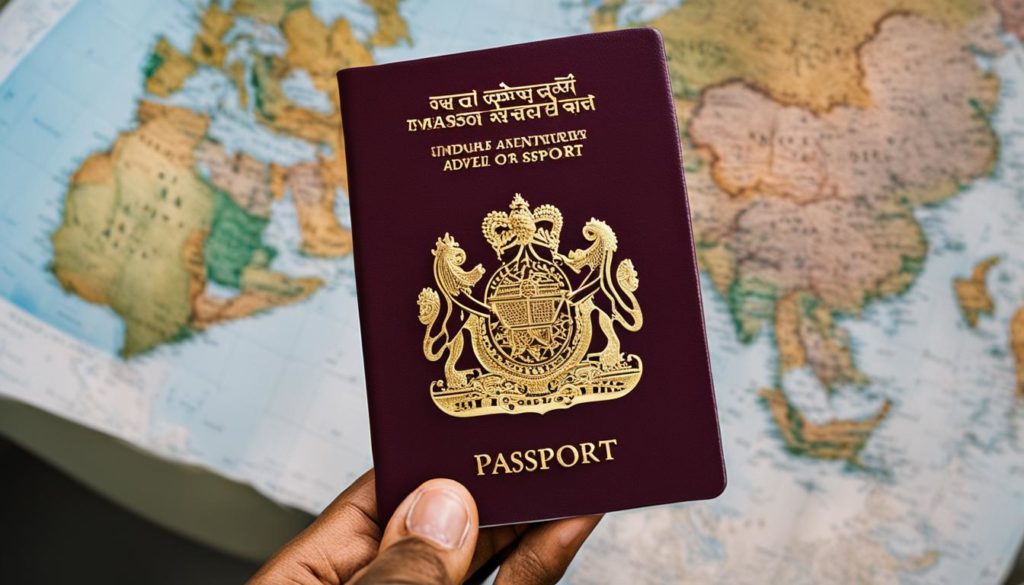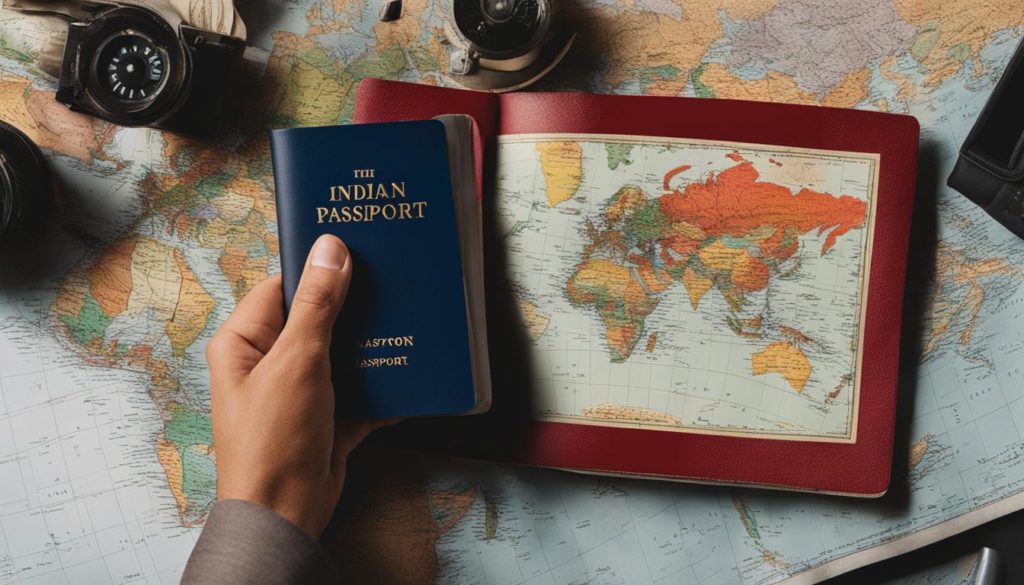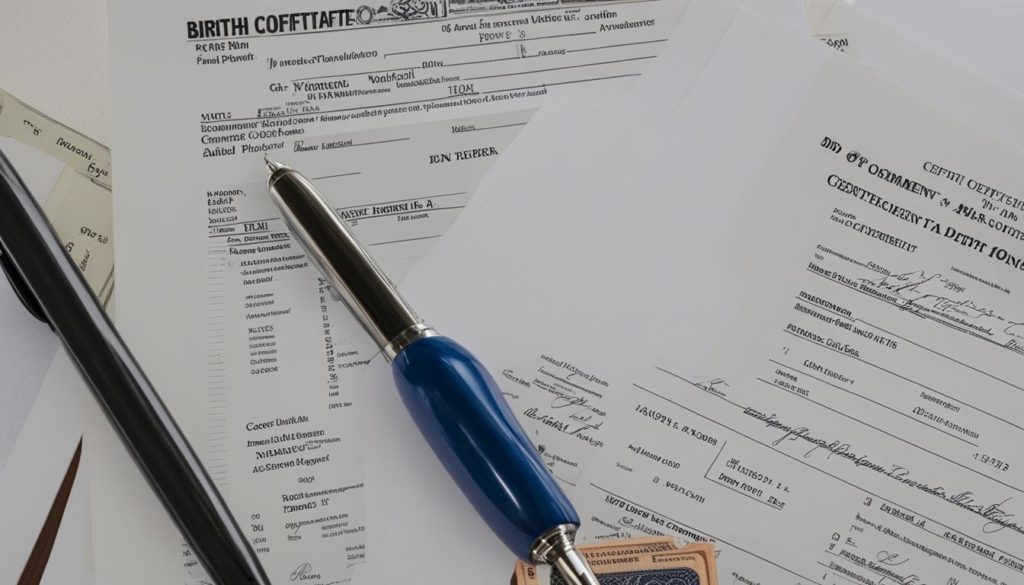Welcome to your comprehensive guide for obtaining an international passport India. Whether you’re planning to travel abroad for business or leisure, having a valid passport is essential. In this guide, we will provide you with all the information you need to navigate the application process smoothly and ensure you are well-prepared for your international journey.
When it comes to international travel, an Indian passport serves as your key to exploring the world. From experiencing different cultures to expanding your opportunities, having an international passport opens up a world of possibilities.
So, let’s dive into the different types of passports available in India, the required documents, the application process, and other important information that will help you secure your international passport with ease. Let’s get started!
Types of Indian Passports
In India, passports come in various types to cater to different travel requirements. Understanding the different types of passports available can help you determine which one suits your needs best. Let’s take a look at the four main types of passports in India:
Blue Passport:
The Blue Passport, also known as the Ordinary Passport, is the most common type of passport issued to regular citizens. It is used for general travel purposes, including tourism, business trips, and personal visits to foreign countries.
White Passport:
The White Passport, also referred to as the Official Passport, is issued to government officials and employees who are representing India on official business. This passport allows them to travel internationally for work-related purposes.
Official or Diplomatic Passport:
The Official or Diplomatic Passport is issued to diplomats, consuls, and high-ranking government officials. It provides them with the necessary travel document to carry out official duties and represent India abroad.
Orange Passport:
The Orange Passport is a recent addition to the Indian passport collection. Introduced in 2018, it is specifically designed for individuals who require emigration check not required (ECNR) status. This passport facilitates faster immigration clearance for certain categories of travelers.

Understanding the different types of Indian passports is essential when applying for a passport. Each type has its own set of features and purposes, catering to various travel and official requirements. Now that we have explored the types of passports, let’s move on to the features and security measures employed in Indian passports.
Features and Security of Indian Passports
Indian passports are highly regarded for their advanced security features, which ensure the authenticity and integrity of the document. These features make it difficult for anyone to counterfeit or tamper with Indian passports.
One of the key security measures is the inclusion of biometric information. Each passport contains the holder’s fingerprint and iris scan, making it nearly impossible for someone else to use the document. The machine-readability of Indian passports further enhances security, allowing for quick and accurate verification of the passport holder’s information.
“The security printing techniques used in Indian passports are state-of-the-art,” says Mr. Rajesh Kumar, an expert in passport services in India. “We utilize holographic images, fluorescent printing, and personalized data pages that are extremely difficult to replicate. Additionally, multi-layered lamination adds another layer of security to prevent tampering.”
Indian passports comply with international security standards, ensuring global recognition and acceptance. The Indian government continuously upgrades its passport designs and security features to stay ahead of evolving threats and technologies.
Security Features Overview:
| Security Feature | Description |
|---|---|
| Biometric Information | Includes fingerprint and iris scan of the passport holder |
| Machine-readability | Allows for quick and accurate verification of passport data |
| Holographic Images | Create a visual deterrent and are difficult to replicate |
| Fluorescent Printing | Visible only under specific lighting conditions, making it hard to duplicate |
| Personalized Data Pages | Each passport has unique design elements, adding another layer of authentication |
| Multi-layered Lamination | Protects the passport from tampering or alteration |
Overall, Indian passports are equipped with cutting-edge security features that ensure the document’s credibility and protect the passport holder’s identity. Travelers can have peace of mind knowing that their Indian passport is a reliable and secure form of identification for international travel.

Your Guide to Getting an International Passport India
Importance of Having a Passport
A passport holds immense importance for international travel, as proof of citizenship, for visa applications, access to government services, banking and financial transactions, legal documentation, insurance and healthcare, personal records, cultural exchange, and global opportunities. It opens up a world of opportunities for personal and professional growth.
Documents Required for Passport Application
The documents required for a passport application in India include proof of address, proof of date of birth, photo ID proof, passport-size photographs, previous passport (if applicable), and other documents depending on specific situations. Documentation requirements may vary for minors, re-issue of passport, and Tatkaal passport applications.
Applying for a Passport Online in India
The process of applying for a passport online in India involves logging in to the Passport Seva portal, selecting the type of passport application, filling out the online application form, paying the fees, scheduling an appointment, and visiting the Passport Seva Kendra (PSK) for document verification. Online application offers convenience and allows for easy tracking of application status.
| Type of Passport | Features |
|---|---|
| Blue Passport | Ordinary passport for regular citizens |
| White Passport | For government officials |
| Official or Diplomatic Passport | For diplomats and government personnel |
| Orange Passport | Introduced in 2018 with a new design |
Passport Fees and Validity
The fees for passport applications in India depend on the type of service required, such as fresh passport, re-issue, Tatkaal passport, or passport replacement. The validity of a passport is typically 10 years for adults, 5 years or until the minor turns 18 for minors, and can vary depending on specific circumstances.
Eligibility Criteria for Passport Application
To be eligible for a passport in India, the applicant must be an Indian citizen. Adults and minors can apply for passports, with different criteria for minors. The application process requires the presence and consent of both parents or legal guardians for minors.
Processing Time and Tracking Application Status
The processing time for a passport application depends on the type of application and associated complexities. The passport application status can be tracked online through the Passport Seva website using the application reference number (ARN) provided during the application process.

Documents Required for Passport Application
When applying for an international passport in India, there are certain documents that you will need to provide. These documents are essential in ensuring the smooth processing of your application. Here is a list of the documents required:
- Proof of address: This can be in the form of a utility bill, voter ID card, or rent agreement.
- Proof of date of birth: This can be a birth certificate, school leaving certificate, or PAN card.
- Photo ID proof: This can be a Aadhaar card, driving license, or ration card.
- Passport-size photographs: You will need to provide a certain number of recent passport-sized photographs.
- Previous passport (if applicable): If you are applying for a renewal or re-issue of your passport, you will need to submit your previous passport.
In addition to these documents, there may be additional requirements based on specific situations. For example, if you are applying for a minor’s passport, you will need to provide additional documents such as the child’s birth certificate and the parents’ passports. Similarly, the documentation requirements may vary for Tatkaal passport applications or cases involving change of name or address. It is important to carefully review the requirements and guidelines provided by the Passport Seva website to ensure that you have all the necessary documents in order to avoid any delays or complications in the application process.
Please note that the list of documents required may be subject to change. It is recommended to refer to the official Passport Seva website for the most up-to-date information.

Table: Documents Required for Passport Application
| Document | Proof Required |
|---|---|
| Proof of address | Utility bill, voter ID card, rent agreement |
| Proof of date of birth | Birth certificate, school leaving certificate, PAN card |
| Photo ID proof | Aadhaar card, driving license, ration card |
| Passport-size photographs | Recent passport-sized photographs |
| Previous passport (if applicable) | Previous passport |
Applying for a Passport Online in India
Applying for an international passport in India has become easier and more convenient with the introduction of online application services. The online process allows individuals to apply for a passport from the comfort of their own homes, eliminating the need for long queues and paperwork. To apply for an international passport in India, follow these simple steps:
Step 1: Visit the Passport Seva Portal
The first step in the online application process is to visit the official Passport Seva portal. This website serves as a one-stop platform for all passport-related services in India. On the portal, you will find detailed information about the different types of passports, required documents, and fees.
Step 2: Fill out the Online Application Form
Once you are on the Passport Seva portal, select the “Apply for Fresh Passport/Reissue of Passport” option to access the online application form. Fill in all the required details accurately, including personal information, contact details, and address. Make sure to double-check the information before submitting the form.
Step 3: Pay the Fees and Schedule an Appointment
After completing the application form, proceed to pay the required fees online. The fees for passport services in India depend on the type of passport and service required. Once the payment is successful, you can schedule an appointment at the nearest Passport Seva Kendra (PSK) for document verification.
Step 4: Visit the Passport Seva Kendra (PSK)
On the day of your appointment, visit the selected PSK along with the necessary documents for verification. The documents required for a passport application in India include proof of address, proof of date of birth, photo ID proof, passport-size photographs, and any other documents specific to your situation. Make sure to carry both original documents and copies for verification purposes.
| Required Documents | Proof of Address | Proof of Date of Birth | Photo ID Proof |
|---|---|---|---|
| Examples | Aadhaar Card, Voter ID Card | Birth Certificate, School Leaving Certificate | PAN Card, Driving License |
Once the documents are verified by the authorities at the PSK, your application will be processed, and you will receive a confirmation of the same. You can also track the status of your passport application online using the application reference number provided during the application process.
Applying for an international passport in India has never been easier. The online application process saves time, reduces paperwork, and provides convenience to the applicants. So, get ready to embark on your international journey with a hassle-free passport application experience!

Your Guide to Getting an International Passport India
Are you planning to travel abroad? Getting an international passport in India is an essential step to ensure a smooth travel experience. In this comprehensive guide, we will provide you with all the information you need to know about obtaining an international passport in India.
Types of Indian Passports
Indian passports come in various types to cater to different travel requirements. The Blue Passport is the ordinary passport for regular citizens, while the White Passport is for government officials. There are also Official or Diplomatic Passports for diplomats and government personnel, and the Orange Passport, which was introduced in 2018 with a new design.
Each type of passport has specific features and purposes, ensuring that you have the right document for your travel needs. Whether you are a citizen or a government official, there is a passport type that suits your requirements.
Features and Security of Indian Passports
Indian passports are renowned for their advanced security features, ensuring the authenticity and security of the document. These features include biometric information, machine-readability, security printing, holographic images, fluorescent printing, personalized data pages, multi-layered lamination, and compliance with international security standards.
With these security measures in place, Indian passports are difficult to counterfeit and provide a reliable identification document for international travel.
Importance of Having a Passport
A passport holds immense importance for international travel, serving as proof of citizenship and allowing you access to various government services. It is also essential for visa applications, banking and financial transactions, legal documentation, insurance and healthcare, personal records, cultural exchange, and global opportunities.
By obtaining an international passport, you open up a world of opportunities for personal and professional growth, enabling you to explore new horizons and expand your experiences.

| Passport Type | Fees | Validity |
|---|---|---|
| Blue Passport | INR 1,500 | 10 years |
| White Passport | INR 2,000 | 10 years |
| Official or Diplomatic Passport | INR 5,000 | 10 years |
| Orange Passport | INR 2,500 | 10 years |
The fees for passport applications in India vary depending on the type of service required. The validity of an Indian passport is typically 10 years for adults. However, it may vary for minors and under specific circumstances.
Now that you have a better understanding of the types of passports, their features and security, as well as their importance, you can proceed confidently with your international travel plans. Make sure to gather all the necessary documents and apply for your passport well in advance to avoid any last-minute hassles.
Section 8: Eligibility Criteria for Passport Application
When applying for an international passport in India, it is important to understand the eligibility criteria to ensure a smooth application process. To be eligible for a passport, the applicant must be an Indian citizen. Both adults and minors can apply for passports, with different criteria for minors.
For adult applicants, proof of Indian citizenship is required. This can be in the form of a birth certificate, school leaving certificate, or any other document that establishes Indian citizenship. In addition to proof of citizenship, applicants must also provide proof of residence, which can be a utility bill, ration card, or any other valid document.
Minors who are less than 18 years old have slightly different requirements. In addition to proof of citizenship and residence, both parents or legal guardians must be present during the application process. The presence and consent of both parents or legal guardians are necessary to ensure the minor’s passport application is processed without any complications.
Eligibility Criteria for Passport Application:
- Proof of Indian citizenship
- Proof of residence
- Presence and consent of both parents or legal guardians for minors
It is important to ensure that all required documents are in order before applying for a passport. Any discrepancies or missing documents can lead to delays or rejection of the application. By fulfilling the eligibility criteria and providing the necessary documentation, applicants can ensure a successful passport application and begin their journey to international travel.
Section 9: Processing Time and Tracking Application Status
Once the passport application is submitted, the processing time will vary depending on the type of application and the complexities involved. Typically, it takes around 30-60 days for a regular passport application to be processed in India. However, in some cases, it may take longer due to factors such as incomplete documentation or background verification.
To ease the process and keep track of the application status, the Passport Seva website provides an online tracking facility. Once the application is submitted, an application reference number (ARN) is generated, which can be used to check the status online. Simply enter the ARN on the website and you will be able to track the progress of your application.
It is important to note that the online tracking system provides real-time updates and notifies applicants about any changes in the application status. This ensures transparency and allows applicants to stay informed throughout the process. In case of any delays or issues, it is advisable to contact the Passport Seva Kendra (PSK) for further assistance.
With the ability to track the application status online, applicants can have peace of mind knowing where their passport application stands. It eliminates the need for constant inquiries and provides an efficient way to stay updated on the progress of the application.